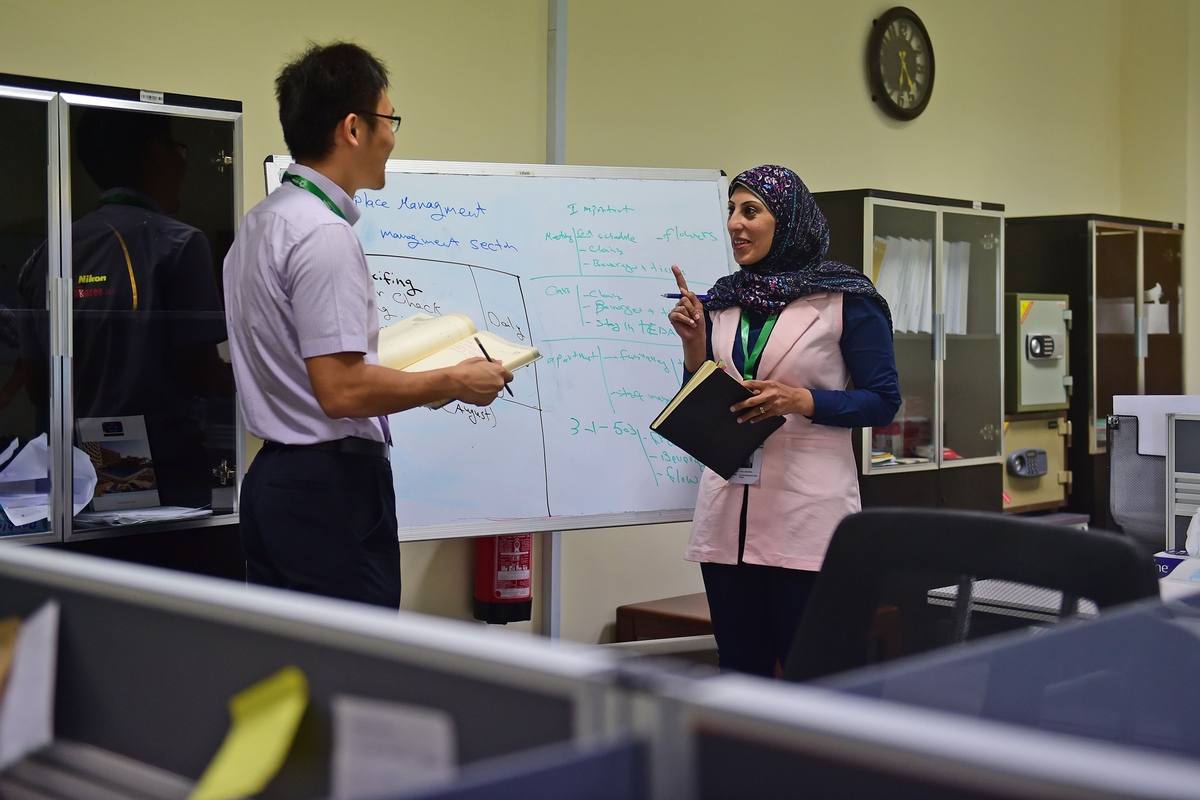
An executive of Egypt Teda Investment Co (right) talks to a Chinese employee in Ain Sokhna, Egypt. China's Belt and Road Initiative is leading to closer ties. [Photo/Xinhua]
ISTANBUL - For Turkish businessman Murat Kolbasi, China's reform and opening-up policy has brought not only dramatic changes to China itself, but also huge profits to foreign companies doing business with China - just like his.
Founded in 1966, Arzum is a major Turkish maker of electrical home appliances. Currently, it annually produces 3.5 million units of six types of electrical home appliances, 25 percent of which are now manufactured in China. Arzum boasts annual imports of about $30 million in goods, much of which is from China.
In the early 1990s, the main focus of Arzum's business was on exporting to Europe, but he faced great pressure from Chinese companies, which offered cheaper prices.
After losing many orders to Chinese companies, Kolbasi started comparing the advantages of Chinese products and those produced by his own company. Finally, he decided to outsource the production of some of his items to China as a way to reduce costs.
"We brought our product designs to China to make products with our brands, which gave a real boost to our business," Kolbasi said.
Arzum will participate in the first International Import Expo, to be held in Shanghai in November, which he said would be a good platform to expand his company's presence in the Chinese market.
Arzum sells only one model of patented toaster in China, but it now is aspiring to become a world-class brand in electrical home appliances by expanding sales in China, the biggest market in the world.
"In the future, Arzum's growth will represent not only the success of a Turkish company, but also of China's economy, as well as Turkey-China economic and trade cooperation," Kolbasi said.
Over the past 26 years, Kolbasi, now chairman of the Turkey-China Business Council of the Foreign Economic Relations Board of Turkey, has visited China many times. Through these visits, he has become a witness to the dramatic changes in China.
Kolbasi said the changes are multidimensional, involving policies, public management, industrial structure and even mindset.
During his early visits, Kolbasi found that the major means of long-distance transportation in China was riding a double-decker bus. But now, high-speed trains have taken over as the main means of transportation in China.
Among other changes, he said that today's China is more than just a world factory, it is increasingly becoming a center of technological innovation with remarkable advantages in industrial designs, technologies and engineering.
With Chinese people's living standards continuously improving, China will offer more opportunities for foreign companies, he said.
Turkey aims to increase its share of global trade to about 1 percent, but it cannot achieve its goal if it only relies on Europe, Kolbasi said.
He expected Turkey to export more to China, which continues opening up to the outside world, so as to achieve a more balanced economic development.
Kolbasi praised China for proposing the Belt and Road Initiative, which was put forward in 2013 with the aim of building a trade and infrastructure network connecting Asia with Africa and Europe along the ancient Silk Road trade routes.
He said that the initiative is inclusive and that it could greatly benefit the dozens of countries and regions along the routes, including those in the Middle East.
"With the Belt and Road Initiative, I think China is sure to elevate the level of its economic cooperation with the (Middle East) region, thus making a contribution to its stability," he said.
Kolbasi said that he really appreciates the willingness of the Chinese side to resolve differences through dialogue, unlike some other powers, which favor the use of force.
"I pin high hopes on China to expand its influence in the Middle East, because I expect China to succeed," he said.


